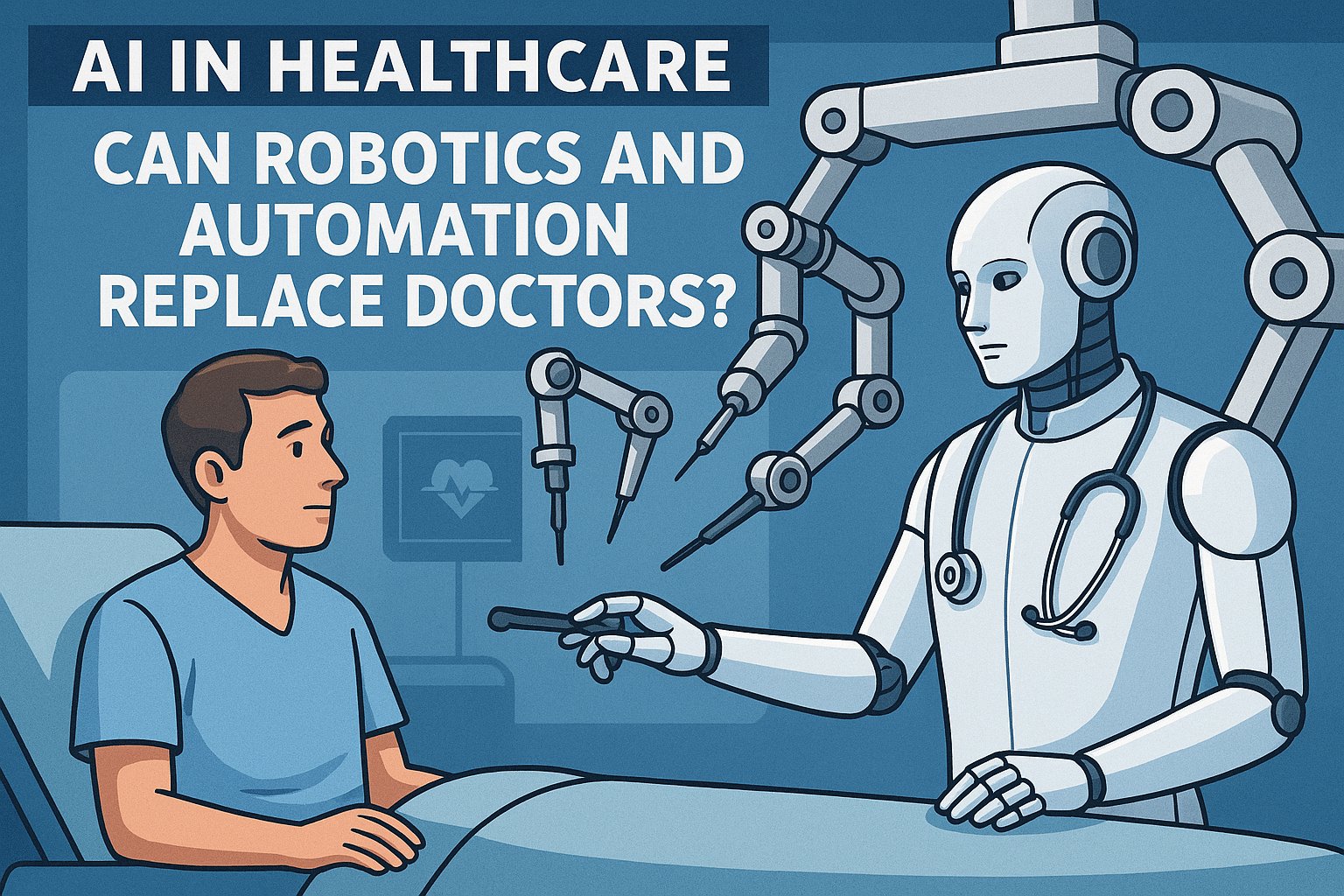“AI in Healthcare: Can Robotics and Automation Replace Doctors?"
Published Date: 05 Apr 2025
Artificial Intelligence functions as an advanced tool that continues to dominate different industries, including healthcare delivery systems. Medical technology through AI diagnostics as well as robotic surgery assistance has revolutionized patient care delivery and medical professional operational approaches. Robotics and automated systems, which entered clinical environments, have initiated an exciting yet divisive discussion about whether machines can substitute doctors' work roles.
The fundamental elements of ethical matters and trust combined with technological constraints form the base of this inquiry. AI serves two opposite functions for medical experts since technology may boost their capabilities, yet also indicates a time when machines will provide healthcare independently. This article examines robotics and automation in healthcare by evaluating the present and prospective functions and determining their ability to take over from human doctors.

The Rise of AI, Robotics, and Automation in Healthcare
Healthcare organizations implement artificial intelligence approaches that exist today and transform medical care operations across numerous dimensions. The combination of machine learning technology enables complex pattern evaluation within large data collections, which helps identify unusual behaviour alongside accurate predictions about health conditions. AI systems utilize natural language processing to decode clinical notes, thereby helping healthcare operations with transcription work and patient medical reports.
Healthcare administration now has Robotic Process Automation (RPA) as one of its popular technologies. Healthcare providers benefit from automated tasks related to billing and appointment scheduling as well as insurance claim processing since both human mistakes decrease and medical personnel focus on essential patient care functions.
Can Machines Truly “Replace” Doctors?
Robotics, along with AI, demonstrates remarkable abilities, but it cannot match the complete capabilities of human doctors. Medical practices consist of more than detecting medical conditions and performing treatments since they demand compassionate instincts along with advanced ethical decisions that stem from genuine human insights.
The example demonstrates how patients sometimes present ambiguous symptoms, including feelings of fatigue and distress. Human doctors exploit their observational skills and elements such as emotional state, along with tone of voice and social background, to interpret patient symptoms better than AI systems can. The accurate diagnosis with patient satisfaction depends on the application of such "soft skills."
Various medical determinations lack clear-cut binary decisions. The management of complex medical cases along with chronic illness treatment demands the consideration of multiple essential aspects, which include patient lifestyle needs and mental state as well as financial resources and belief systems. Absolute emotional and ethical assessments are human capabilities that artificial intelligence systems do not possess to suggest evidence-based choices.
Tasks Where Robots and Automation Excel
The capabilities of robotics and automation scale past human limits when dealing with specific areas in the workplace. Android devices deliver excellent performance in precision tasks along with constant repeatability and automated information manipulation.
Medical algorithm systems in radiology applications demonstrate exceptional tumor and fracture diagnosis abilities during X-ray and MRI examinations. Pathologists benefit from AI technology that performs tissue slide analysis in shorter periods than any human pathologist can achieve. These instruments never experience fatigue, and they maintain complete attention to detail, and they also never require rest.
The Future: Collaboration, Not Replacement
Hospitals employ robots for pharmaceutical distribution as well as antibacterial cleaning and test specimen transport. The routine tasks performed by robots contribute directly to both hospital processes and infection prevention at a time when these functions are vital for COVID-19 management.
Service-based virtual nursing assistants are emerging, which provide continuous patient monitoring along with medication scheduling reminders as well as voice interface question responses for patients. The systems work alongside nursing staff instead of replacing them to provide enhanced accessibility of healthcare services for distant locations with limited resources.
Conclusion
AI robotics technology will keep transforming healthcare through superior medical results and economical practices that increase medical services. But they are not a panacea. Medical expertise relies not only on scientific foundation but also on artistic competence. Medical equipment possesses capabilities to learn protocols alongside data processing; however, it lacks the human emotional intelligence combined with cultural understanding as well as ethical judgment abilities that construct a skilled doctor.
Instead of worrying about replacement, healthcare professionals should create partnerships between human practitioners and machines. The relation between human physicians and AI systems should be characterized as collaboration rather than competition because AI technology exists to make doctors more effective healers.
Maximize your value and knowledge with our 5 Reports-in-1 Bundle - over 40% off!
Our analysts are ready to help you immediately.
